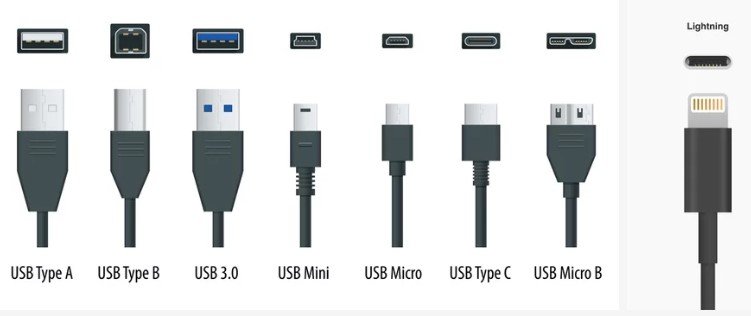USB (Universal Serial Bus) connectors come in various types, each designed for specific purposes. Here’s a brief overview:
Types of USB Connectors
- USB-A: The most common type, rectangular in shape, found on computers, chargers, and many peripherals.
- USB-B: Square-shaped, typically used for larger devices like printers.
- USB-C: Reversible and versatile, becoming the standard for newer devices like smartphones and laptops.
- Micro-USB: Smaller than USB-A, commonly used on older Android phones and devices.
- Mini-USB: Even smaller, used in older devices like MP3 players and some cameras.
- Lightning: Proprietary connector used by Apple for iPhones, iPads, and iPods.

USB Versions
USB versions also differ in terms of data transfer speeds:
- USB 1.0: Slowest, suitable for basic peripherals.
- USB 2.0: Faster, widely used for external hard drives and other peripherals.
- USB 3.0/3.1/3.2: Even faster, ideal for high-speed data transfer.
- USB 4.0: Latest version, offering the highest speeds and best performance
Comparison of Data transfer speeds of different USB connector types and versions:
| USB Type/Version | Data Transfer Rate |
|---|---|
| USB 1.0 | 1.5 Mbps |
| USB 1.1 (Full Speed) | 12 Mbps |
| USB 2.0 (Hi-Speed) | 480 Mbps |
| USB 3.0 (SuperSpeed) | 5 Gbps |
| USB 3.1 (Gen 2) | 10 Gbps |
| USB 3.2 (Gen 2×2) | 20 Gbps |
| USB 4.0 | 40 Gbps |
Below table ,that is showing up a comparison of typical usage for different USB connector types:
| USB Type | Typical Usage |
|---|---|
| USB-A | Computers, chargers, peripherals, printers |
| USB-B | Printers, external hard drives, large peripherals |
| USB-C | Smartphones, laptops, tablets, high-speed data transfer |
| Micro-USB | Older Android phones, small devices |
| Mini-USB | Older MP3 players, cameras, small peripherals |
| Lightning | Apple iPhones, iPads, iPods |